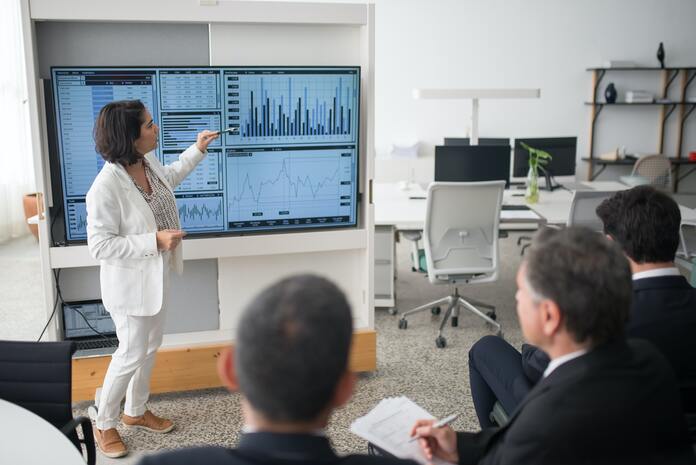This morning, stock markets experienced a significant surge, with the September E-Mini S&P 500 futures (ESU23) rising by +0.83% to reach a 16-month high, and Sep Nasdaq 100 E-Mini futures (NQU23) seeing an impressive increase of +1.47%.
The driving force behind this rally is speculation that the Federal Reserve might be nearing the end of its 16-month-long policy-tightening cycle. Additionally, the technology sector saw a remarkable boost, with Meta Platforms leading the charge by jumping +8% after reporting better-than-expected Q2 revenue. Moreover, pre-market trading witnessed a rise in chip stocks as Samsung Electronics projected increased memory demand due to artificial intelligence by year-end.
The market’s positive momentum continued to gain strength as signs emerged suggesting the U.S. economy might achieve a soft landing. The unexpected growth of U.S. Q2 GDP, fueled by stronger-than-expected consumer spending, contributed to this sentiment. Furthermore, the Q2 core PCE price index showed a slower-than-anticipated pace of increase.
The Q2 corporate earnings season kicked off on a strong note, with nearly 80% of U.S. companies beating profit estimates.
As expected, the European Central Bank (ECB) raised its main refinancing rate by 25 basis points to 4.25% and asserted that future decisions would aim to maintain sufficiently restrictive interest rates to achieve the 2% medium-term inflation target.
In a surprising turn of events, U.S. weekly initial unemployment claims fell unexpectedly by -7,000, hitting a 5-month low of 221,000, indicating a robust labor market contrary to the expected increase to 235,000.
The reported U.S. Q2 GDP growth of +2.4% (q/q annualized) surpassed expectations of +1.8%, thanks to a +1.6% rise in Q2 personal consumption, which also outperformed predictions of +1.2%. Moreover, the Q2 core PCE price index eased to +3.8% q/q, better than the forecasted +4.0% q/q, and marked the slowest pace of increase since Q1 2021.
Surprisingly, U.S. June capital goods new orders nondefense ex-aircraft and parts witnessed an unexpected rise of +0.2% m/m, countering predictions of a decline of -0.1% m/m.
The market is currently projecting a 23% chance of a +25 basis points rate hike at the upcoming September 20 FOMC meeting.
Global bond yields are displaying mixed trends. The 10-year T-note yield rose by +4.2 basis points to 3.909%, while the 10-year German bund yield decreased by -3.3 basis points to 2.452%. The 10-year UK Gilt yield experienced a modest increase of +1.2 basis points to 4.293%.
Overseas stock markets have divergent performances, with the Euro Stoxx 50 seeing an impressive climb of +1.87%. However, China’s Shanghai Composite Index closed down by -0.20%, and Japan’s Nikkei Stock Index ended up by +0.68%.
The Euro Stoxx 50 reached a 15-year high today, with positive corporate earnings results being a significant driving factor. Strong performances from BNP Paribas SA, Nestle SA, and Carrefour SA, all beating expectations, contributed to the overall market boost. Speculation regarding the potential end of interest rate hikes by both the ECB and the Fed further supported the rally. On the downside, Shell Plc retreated due to slower profits, and Barclays Plc tumbled following a -41% decline in quarterly trading revenue.
The German Aug GfK consumer confidence index rose +0.8 to -24.4, surpassing expectations of -24.8.
China’s Shanghai Composite experienced a moderate decline from a 1-1/2 week high, primarily impacted by telecom stocks and their suppliers, as Chinese smartphone shipments fell by -2.1% in Q2. This decline marks consecutive quarterly declines in smartphone shipments since the beginning of 2022. Despite the initial rally in technology stocks, particularly electric-vehicle shares surging due to Volkswagen AG’s investment plans in China’s XPeng, property stocks sustained recent gains following expectations of continuous easing of property policies in the second half of the year, as reported by Securities Times.
China’s Jun industrial profits also faced a challenging situation, declining by -8.3% y/y for the fourth consecutive month.
Japan’s Nikkei Stock Index achieved a 3-week high and closed moderately higher, supported by speculations regarding the potential end of the Federal Reserve’s 16-month-long tightening cycle. Additionally, stronger-than-expected earnings results from Samsung Electronics sparked a rally in Japanese electronics makers. However, gains were limited due to the yen’s increase against the dollar, negatively affecting exporter stocks. The yen’s rise was driven by short covering ahead of Friday’s BOJ meeting, amid rumors that policymakers may tweak the BOJ’s ultra-loose monetary policy. Reports suggest that the BOJ is considering a sharp increase in their inflation forecast for this fiscal year, a move that could lead to a tightening of monetary policy in future meetings.
Featured Image:









